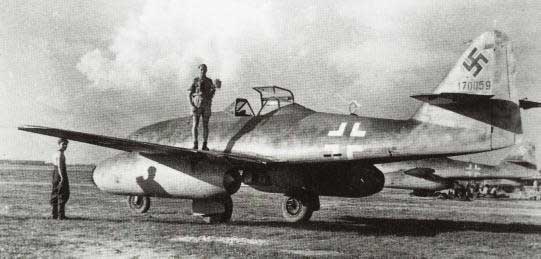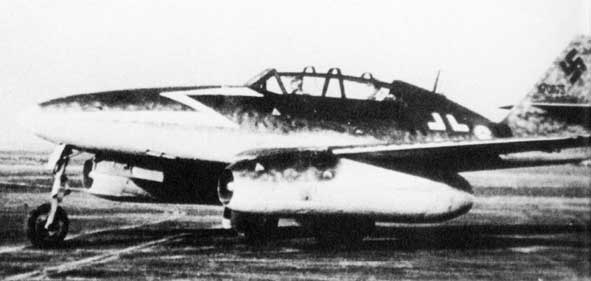Messerchmitt Me 262
Jets45 Histories
Messerchmitt Me 262
Mulit Role Combat Aircraft
 The V-1 in 1941
The V-1 in 1941
Specification for A-1b
Engine: 2x Junkers Jumo 004B turbojets
Wing Span: 12.65 m
Length: 10.60 m
Height: 2.80 m
Weight: Empty 3,803 kg / Loaded 6,697 kg
Maximum Speed: 835 km/h
Ceiling: 11,400 m
Range: 1,230 km
Crew: 1
Armament: 4x 30mm cannons / 24 R4M AA rockets
History:
 |
The Design of the World's first operational
jet powered combat aircraft was started in April 1939. Initiated by a
RLM contract in December 1938 for a high speed, multi-role aircraft, capable
of accepting any available propulsion unit, the aircraft was known as
the P.1065. Intended to be fitted with BMW engines the Me 262 V1 made
it's first flight on the 18/4/1941, but only propelled by a Junkers Jumo
210 piston engine temporarily fitted in the nose as the BMW engines were
not ready. How ever by March 1942 the engines were fitted and the aircraft
made ready for it's first flight with jet power, fortunately the piston
engine was retained as the BMW turbojets failed immediately after take
off and saved a fatal crash. At this point it was decided to fit the new
Junker Jumo 004 turbojets, on the 18/7/1942 the Me 262 V3 made it's first
flight on jet power alone |
| By 4/4/1943 the specifications for the Me
262 were finalizes by the RLM including bomber, fighter and reconnaissance
rolls. In December 1943 a operational training unit was set up Erprobungskommando
262 which received it's first jets on the 10/6/1944 marking the beginning
of the Me 262's service career |
 |
| |
EKdo's Me 262A1's June 1944
|
. 
|
The need for training resulted
in the Me 262 B-1a
|
|
|
Which was converted into
the Me262 B-1a/U1
Night Fighter
|
|
To show just how good the design of the Me 262 was as a mutil-roll
aircraft one just has to look at the staggering number of variants made by May
1945, fourteen in all not including prototypes (see List of Jets). But was not
the end for the Me 262 as manufacturing of the A1a and B1a would continue in
Czechoslovakia, all be it in very small quantities until the late forties.
|
|
A line drawing of the most advanced Me262
made, the HG II (1944) |






